Actor-comedian and Oscar®–nominated writer Kumail Nanjiani and actress–producer–director Tracee Ellis Ross announced the 91st Oscars® nominations today (January 22), live from the Academy’s headquarters in Beverly Hills via a global live stream on Oscar.com, Oscars.org, the Academy’s digital platforms, a satellite feed, and broadcast media.
Academy members from each of the 17 branches vote to determine the nominees in their respective categories – actors nominate actors, film editors nominate film editors, etc. In the Animated Feature Film and Foreign Language Film categories, nominees are selected by a vote of multi-branch screening committees. All voting members are eligible to select the Best Picture nominees.
The 91st Oscars will be held on Sunday, February 24, 2019, at the Dolby Theatre® at Hollywood & Highland Center® in Hollywood, and will be televised live on the ABC Television Network. The Oscars also will be televised live in more than 225 countries and territories worldwide
And The Nominees are.
Performance by an actor in a leading role
- Christian Bale in “Vice”
- Bradley Cooper in “A Star Is Born”
- Willem Dafoe in “At Eternity’s Gate”
- Rami Malek in “Bohemian Rhapsody”
- Viggo Mortensen in “Green Book”
Performance by an actor in a supporting role
- Mahershala Ali in “Green Book”
- Adam Driver in “BlacKkKlansman”
- Sam Elliott in “A Star Is Born”
- Richard E. Grant in “Can You Ever Forgive Me?”
- Sam Rockwell in “Vice”
Performance by an actress in a leading role
- Yalitza Aparicio in “Roma”
- Glenn Close in “The Wife”
- Olivia Colman in “The Favourite”
- Lady Gaga in “A Star Is Born”
- Melissa McCarthy in “Can You Ever Forgive Me?”
Performance by an actress in a supporting role
- Amy Adams in “Vice”
- Marina de Tavira in “Roma”
- Regina King in “If Beale Street Could Talk”
- Emma Stone in “The Favourite”
- Rachel Weisz in “The Favourite”
Best animated feature film of the year
- “Incredibles 2” Brad Bird, John Walker and Nicole Paradis Grindle
- “Isle of Dogs” Wes Anderson, Scott Rudin, Steven Rales and Jeremy Dawson
- “Mirai” Mamoru Hosoda and Yuichiro Saito
- “Ralph Breaks the Internet” Rich Moore, Phil Johnston and Clark Spencer
- “Spider-Man: Into the Spider-Verse” Bob Persichetti, Peter Ramsey, Rodney Rothman, Phil Lord and Christopher Miller
Achievement in cinematography
- “Cold War” Łukasz Żal
- “The Favourite” Robbie Ryan
- “Never Look Away” Caleb Deschanel
- “Roma” Alfonso Cuarón
- “A Star Is Born” Matthew Libatique
Achievement in costume design
- “The Ballad of Buster Scruggs” Mary Zophres
- “Black Panther” Ruth Carter
- “The Favourite” Sandy Powell
- “Mary Poppins Returns” Sandy Powell
- “Mary Queen of Scots” Alexandra Byrne
Achievement in directing
- “BlacKkKlansman” Spike Lee
- “Cold War” Paweł Pawlikowski
- “The Favourite” Yorgos Lanthimos
- “Roma” Alfonso Cuarón
- “Vice” Adam McKay
Best documentary feature
- “Free Solo” Elizabeth Chai Vasarhelyi, Jimmy Chin, Evan Hayes and Shannon Dill
- “Hale County This Morning, This Evening” RaMell Ross, Joslyn Barnes and Su Kim
- “Minding the Gap” Bing Liu and Diane Quon
- “Of Fathers and Sons” Talal Derki, Ansgar Frerich, Eva Kemme and Tobias N. Siebert
- “RBG” Betsy West and Julie Cohen
Best documentary short subject
- “Black Sheep” Ed Perkins and Jonathan Chinn
- “End Game” Rob Epstein and Jeffrey Friedman
- “Lifeboat” Skye Fitzgerald and Bryn Mooser
- “A Night at The Garden” Marshall Curry
- “Period. End of Sentence.” Rayka Zehtabchi and Melissa Berton
Achievement in film editing
- “BlacKkKlansman” Barry Alexander Brown
- “Bohemian Rhapsody” John Ottman
- “The Favourite” Yorgos Mavropsaridis
- “Green Book” Patrick J. Don Vito
- “Vice” Hank Corwin
Best foreign language film of the year
- “Capernaum” Lebanon
- “Cold War” Poland
- “Never Look Away” Germany
- “Roma” Mexico
- “Shoplifters” Japan
Achievement in makeup and hairstyling
- “Border” Göran Lundström and Pamela Goldammer
- “Mary Queen of Scots” Jenny Shircore, Marc Pilcher and Jessica Brooks
- “Vice” Greg Cannom, Kate Biscoe and Patricia DeHaney
Achievement in music written for motion pictures (Original score)
- “Black Panther” Ludwig Goransson
- “BlacKkKlansman” Terence Blanchard
- “If Beale Street Could Talk” Nicholas Britell
- “Isle of Dogs” Alexandre Desplat
- “Mary Poppins Returns” Marc Shaiman
Achievement in music written for motion pictures (Original song)
- “All The Stars” from “Black Panther”
Music by Mark Spears, Kendrick Lamar Duckworth and Anthony Tiffith; Lyric by Kendrick Lamar Duckworth, Anthony Tiffith and Solana Rowe - “I’ll Fight” from “RBG”
Music and Lyric by Diane Warren - “The Place Where Lost Things Go” from “Mary Poppins Returns”
Music by Marc Shaiman; Lyric by Scott Wittman and Marc Shaiman - “Shallow” from “A Star Is Born”
Music and Lyric by Lady Gaga, Mark Ronson, Anthony Rossomando and Andrew Wyatt - “When A Cowboy Trades His Spurs For Wings” from “The Ballad of Buster Scruggs”
Music and Lyric by David Rawlings and Gillian Welch
Best motion picture of the year
- “Black Panther” Kevin Feige, Producer
- “BlacKkKlansman” Sean McKittrick, Jason Blum, Raymond Mansfield, Jordan Peele and Spike Lee, Producers
- “Bohemian Rhapsody” Graham King, Producer
- “The Favourite” Ceci Dempsey, Ed Guiney, Lee Magiday and Yorgos Lanthimos, Producers
- “Green Book” Jim Burke, Charles B. Wessler, Brian Currie, Peter Farrelly and Nick Vallelonga, Producers
- “Roma” Gabriela Rodríguez and Alfonso Cuarón, Producers
- “A Star Is Born” Bill Gerber, Bradley Cooper and Lynette Howell Taylor, Producers
- “Vice” Dede Gardner, Jeremy Kleiner, Adam McKay and Kevin Messick, Producers
Achievement in production design
- “Black Panther” Production Design: Hannah Beachler; Set Decoration: Jay Hart
- “The Favourite” Production Design: Fiona Crombie; Set Decoration: Alice Felton
- “First Man” Production Design: Nathan Crowley; Set Decoration: Kathy Lucas
- “Mary Poppins Returns” Production Design: John Myhre; Set Decoration: Gordon Sim
- “Roma” Production Design: Eugenio Caballero; Set Decoration: Bárbara Enríquez
Best animated short film
- “Animal Behaviour” Alison Snowden and David Fine
- “Bao” Domee Shi and Becky Neiman-Cobb
- “Late Afternoon” Louise Bagnall and Nuria González Blanco
- “One Small Step” Andrew Chesworth and Bobby Pontillas
- “Weekends” Trevor Jimenez
Best live action short film
- “Detainment” Vincent Lambe and Darren Mahon
- “Fauve” Jeremy Comte and Maria Gracia Turgeon
- “Marguerite” Marianne Farley and Marie-Hélène Panisset
- “Mother” Rodrigo Sorogoyen and María del Puy Alvarado
- “Skin” Guy Nattiv and Jaime Ray Newman
Achievement in sound editing
- “Black Panther” Benjamin A. Burtt and Steve Boeddeker
- “Bohemian Rhapsody” John Warhurst and Nina Hartstone
- “First Man” Ai-Ling Lee and Mildred Iatrou Morgan
- “A Quiet Place” Ethan Van der Ryn and Erik Aadahl
- “Roma” Sergio Díaz and Skip Lievsay
Achievement in sound mixing
- “Black Panther” Steve Boeddeker, Brandon Proctor and Peter Devlin
- “Bohemian Rhapsody” Paul Massey, Tim Cavagin and John Casali
- “First Man” Jon Taylor, Frank A. Montaño, Ai-Ling Lee and Mary H. Ellis
- “Roma” Skip Lievsay, Craig Henighan and José Antonio García
- “A Star Is Born” Tom Ozanich, Dean Zupancic, Jason Ruder and Steve Morrow
Achievement in visual effects
- “Avengers: Infinity War” Dan DeLeeuw, Kelly Port, Russell Earl and Dan Sudick
- “Christopher Robin” Christopher Lawrence, Michael Eames, Theo Jones and Chris Corbould
- “First Man” Paul Lambert, Ian Hunter, Tristan Myles and J.D. Schwalm
- “Ready Player One” Roger Guyett, Grady Cofer, Matthew E. Butler and David Shirk
- “Solo: A Star Wars Story” Rob Bredow, Patrick Tubach, Neal Scanlan and Dominic Tuohy
Adapted screenplay
- “The Ballad of Buster Scruggs” Written by Joel Coen & Ethan Coen
- “BlacKkKlansman” Written by Charlie Wachtel & David Rabinowitz and Kevin Willmott & Spike Lee
- “Can You Ever Forgive Me?” Screenplay by Nicole Holofcener and Jeff Whitty
- “If Beale Street Could Talk” Written for the screen by Barry Jenkins
- “A Star Is Born” Screenplay by Eric Roth and Bradley Cooper & Will Fetters
Original screenplay
- “The Favourite” Written by Deborah Davis and Tony McNamara
- “First Reformed” Written by Paul Schrader
- “Green Book” Written by Nick Vallelonga, Brian Currie, Peter Farrelly
- “Roma” Written by Alfonso Cuarón
- “Vice” Written by Adam McKay

TV
Did JD from Scrubs Have a Dark Past?

TW: Discussions of child abuse and neglect.
The sitcom Scrubs ran from 2001- 2010 delighting viewers with the escapades of daydreaming Dr ‘JD’ Dorian and his friends. Unlike most TV sitcoms Scrubs perfectly balanced the comedic and the tragic. Being set in a teaching hospital with most of the main cast being doctors; there was plenty of fodder for some truly heart-wrenching storylines.
Like with most sitcoms, if you look under the jolly veneer (and have too much time on your hands) a much darker story emerges. In Scrubs, I would argue, this may be the past of its titular protagonist JD (played by Zach Braff). Some fans (ok, me) speculate that not only did JD have a less than ideal childhood but an abusive one.
Hints of this could be interpretated throughout the series:-
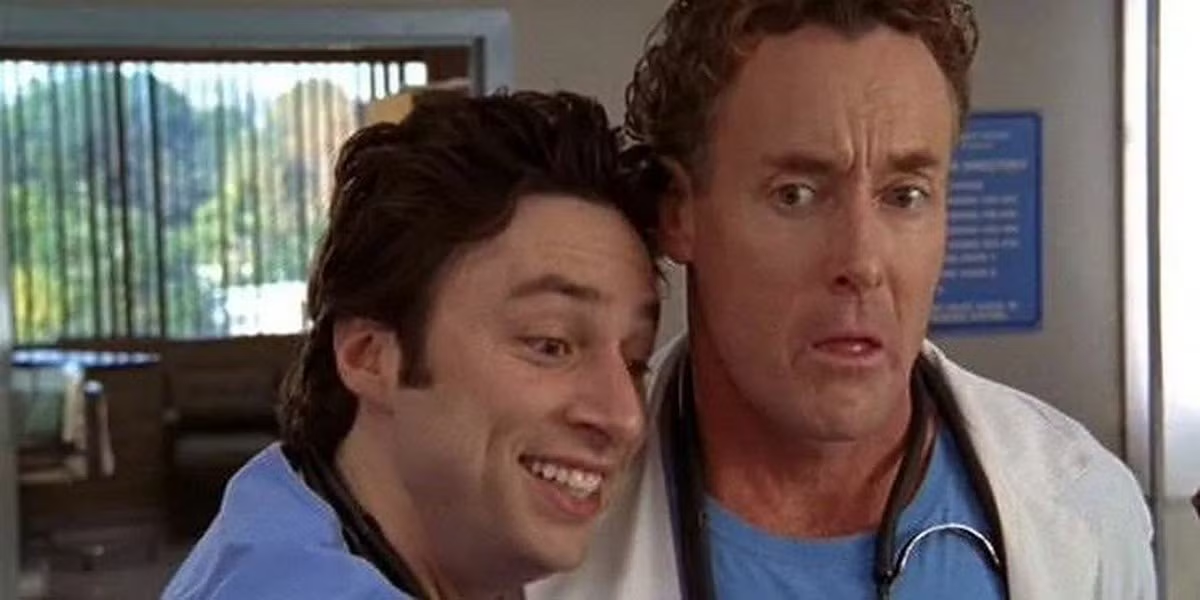
1. Attachment to Dr Cox
One of the most popular aspects of the series is the oddly touching relationship between mentor and mentee: Dr Cox (John C McGinley) and JD. It’s perfectly normal to admire and want to emulate an older colleague. But JD’s admiration of Dr Cox always seemed to go a step further. JD looked to the older doc as not only a mentor but a father figure.
JD explicitly states this throughout the series. Most notably in the finale; when during his much sought after hug JD claims Dr Cox smells “like a father figure”. This is odd as Dr Cox is only about 13 years JD’s senior. We know JD’s biological father (played by the late John Ritter) was pretty much absent during JD’s childhood. Is this yearning for a parental figure a way to fix JD’s damaged childhood?
As loathe as I am to criticise a fan favourite but Dr Cox openly mocks and belittles JD, almost never referring to his protégé by name. Instead by a vast archive of disparaging nicknames. The show does establish that there is love and respect om both sides, from Dr Cox deep down (deep, deep down). But why does JD not only put up with as well as seek out this treatment? Very masochistic. Or, has JD been subconsciously taught that taunts and aggression equate to love?

2. Feels Affinity with Dr Cox and Elliot
The show establishes early on that Dr Cox had an abusive homelife as a child. He openly reminisces about his parents being violent alcoholics. Is this the real reason that JD clamours for Dr Cox’s attention? Does JD see Dr Cox as an inspiration of someone who came from a similar background to his and became a well-respected doctor and family man?
Is the same true of JD’s on/off girlfriend, future wife and fellow doctor; Elliot? The show establishes that Elliot’s parents are mentally, emotionally, and financially abusive. Are JD and Elliot drawn to one another (partly) because they are both traumatised by their past? Even when it is proven time and time again that they are not suited.

3. Hostile Relationship with Older Brother
JD’s older brother Dan (Tom Cavanagh) appears several times in the show. Despite regularly visiting his kid brother, JD makes clear that these visits are not welcomed. JD’s ire is uncharacteristic as he’s shown as an ardent people pleaser throughout the show. Yes, Dan did bully JD throughout their childhood, though it’s unclear whether this was normal sibling rivalry or more.
In Series 3 Episode 5 ‘My Brother, Where Art Thou?’ JD attempts to cut off contact with Dan claiming that Dan never looked out for him. Even as children of divorce why is JD so upset his brother didn’t protect or “come through” for him? In the same scene JD comments about how their mother “married anyone that rang the doorbell”. Reading into this (hey, it’s what we’re here for) did Dan not protect JD from these multiple husbands?

4. Audience Never Actually See JD’s Mother
To me this is the most obvious that something is suspicious about the Dorian matriarch. Despite seeing every other cast members mother (except Dr Cox but its implied that his parents are dead) we never see JD’s. He, at the very least, seems to have a good relationship with his mother. Mostly speaks highly of her and she calls often. It doesn’t follow the trope many sitcoms use; having a character the audience never physically sees being used for comedic effect.
We hear JD’s mum (Barbara) speak in a flashback (Series 3 Episode 21 ‘My Self-Examination’). While Barbara was tucking young JD into bed she was saying some quite toxic things to her child, like how no women will ever be good enough for him. It is clear this scene is supposed to be somewhat creepy as Barbara is stroking the child’s face in an inappropriate manner. Adult JD even refers to his mum as “sexy” in the same episode. Very Freudian but in the light of everything else we are discussing: very disturbing!
5. JD’s Mother Drank
Linked to number 4 JD admits in Series 8 Episode 2 ‘My Last Words’ JD admits his mum “drank a lot”. Does this statement answer some questions about JD’s odd childhood?
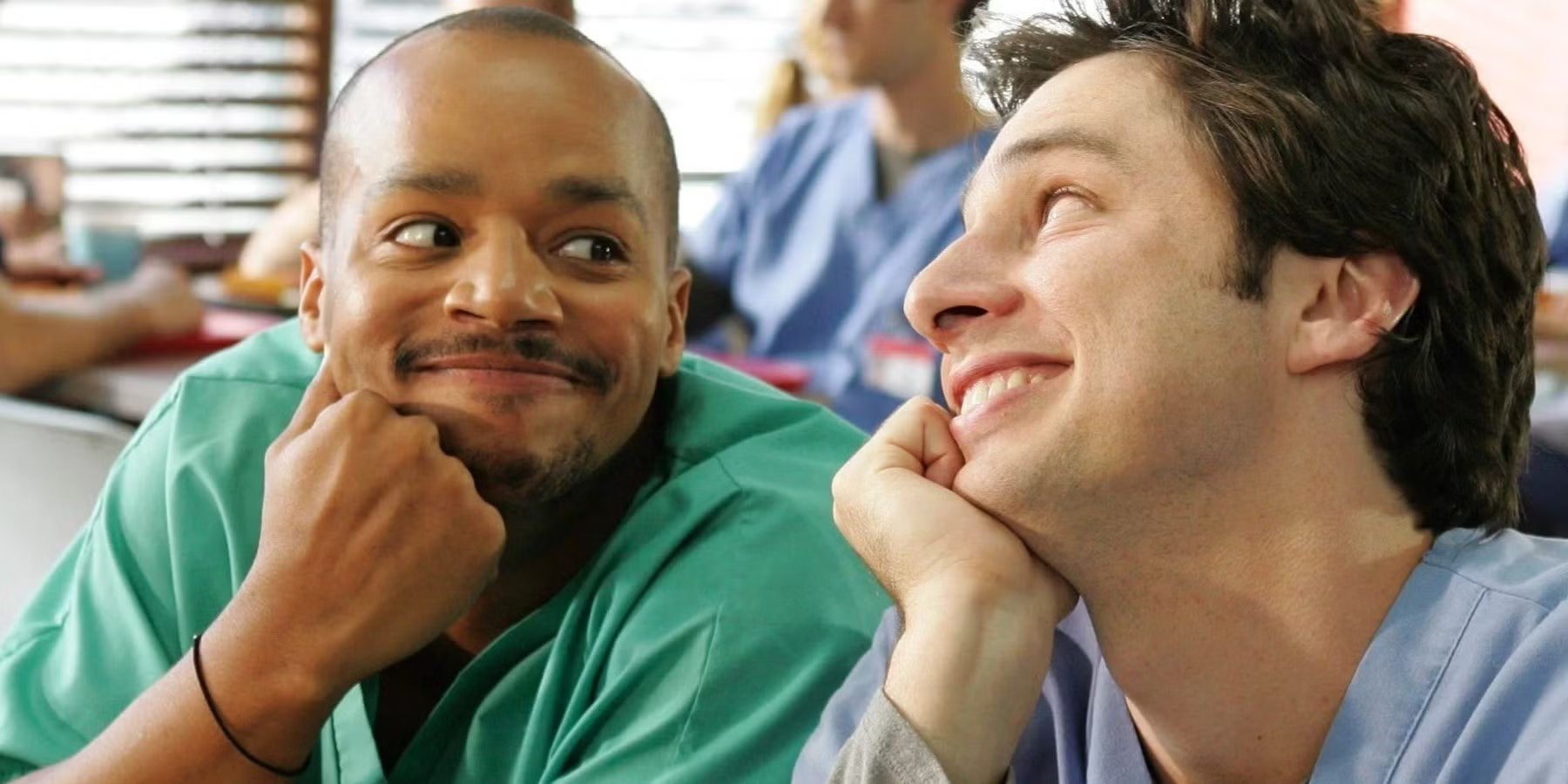
6. JD is a People Pleaser
As we have already mentioned JD is a pathological people pleaser (what’s that like?). As a doctor he goes above and beyond for his patients. He does everything from finding patients estranged family members (Series 4 Episode 11 ‘My Unicorn’) to shaving his head in solidarity with a chemo patient (Series 5 Episode 15 ‘My Extra Mile’). Of course this is all very commendable but JD particularly enjoys the gratitude. Why does he need this validation? Is this a coping mechanism from a turbulent background who had to go above and beyond to get the love that should have been unconditional?
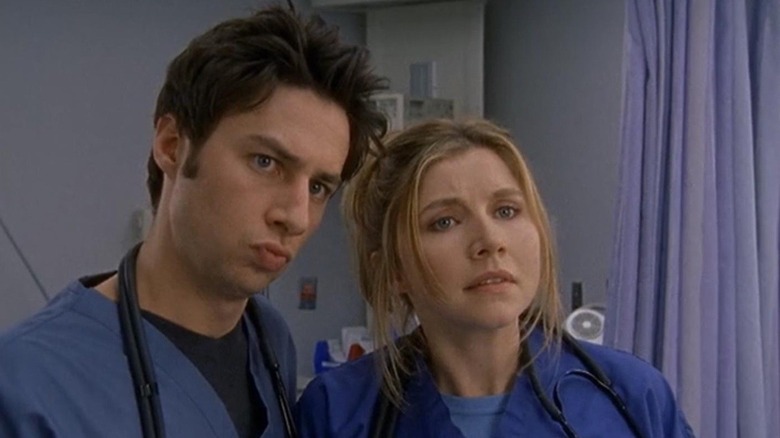
7. Extremely Tactile
Another of JD’s character traits is he extremely tactile. This is of course played up for comedy with his ‘sneak hugs’ (Series 6 Episode 13 ‘My Scrubs’) delivered to the stand-offish Dr Cox or the fact he has his friends on a ‘hugging schedule’ (Series 5 Episode 8 ‘My Big Bird’). Is this someone trying to seek the love and affection he never received in childhood? Or reassure himself that the people he loves won’t disappear?
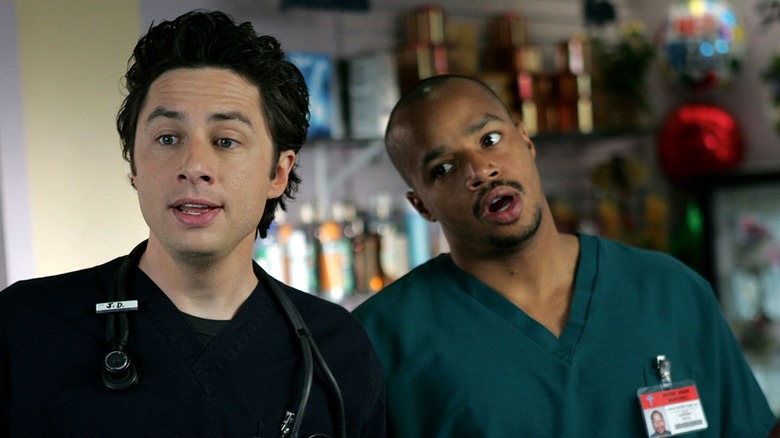
8. Self-Sabotaging
A common reaction to childhood trauma is self-sabotaging behaviour. In his romantic relationships JD has this in spades. Throughout the run of the show JD has more romantic partners than the rest of cast put together. It is acknowledged that JD goes from relationship to relationship with alarming speed and breaks them off for shallow reasons. Again, he may be trying to seek the love and security he never had in childhood.
JD’s damaged psyche is put on full display when after spending the majority of the series chasing Elliot she finally leaves her loving boyfriend for him. JD immediately decides he doesn’t want her anymore to many fans outrage (Series 3 Episode 20 ‘My Fault’).
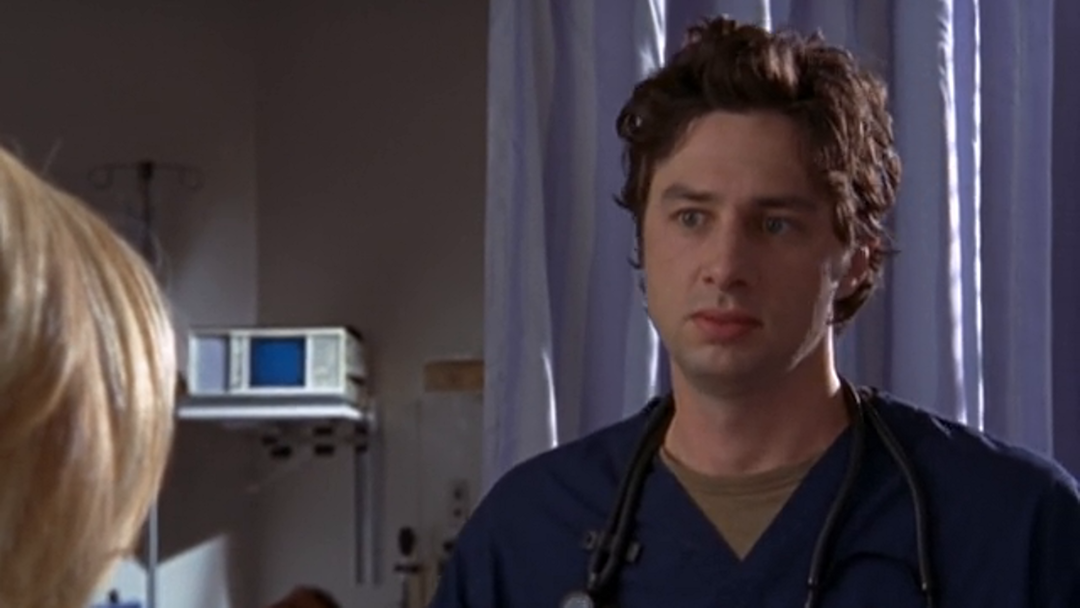
9. No Therapy
As well as never actually seeing his mother, we never see JD engaged in any kind of therapy. All of the other characters attend various types of therapy throughout the series. JD does not, despite arguably needing it the most. Is JD perhaps too scared of what therapy might uncover or not want to deal with his trauma head on?
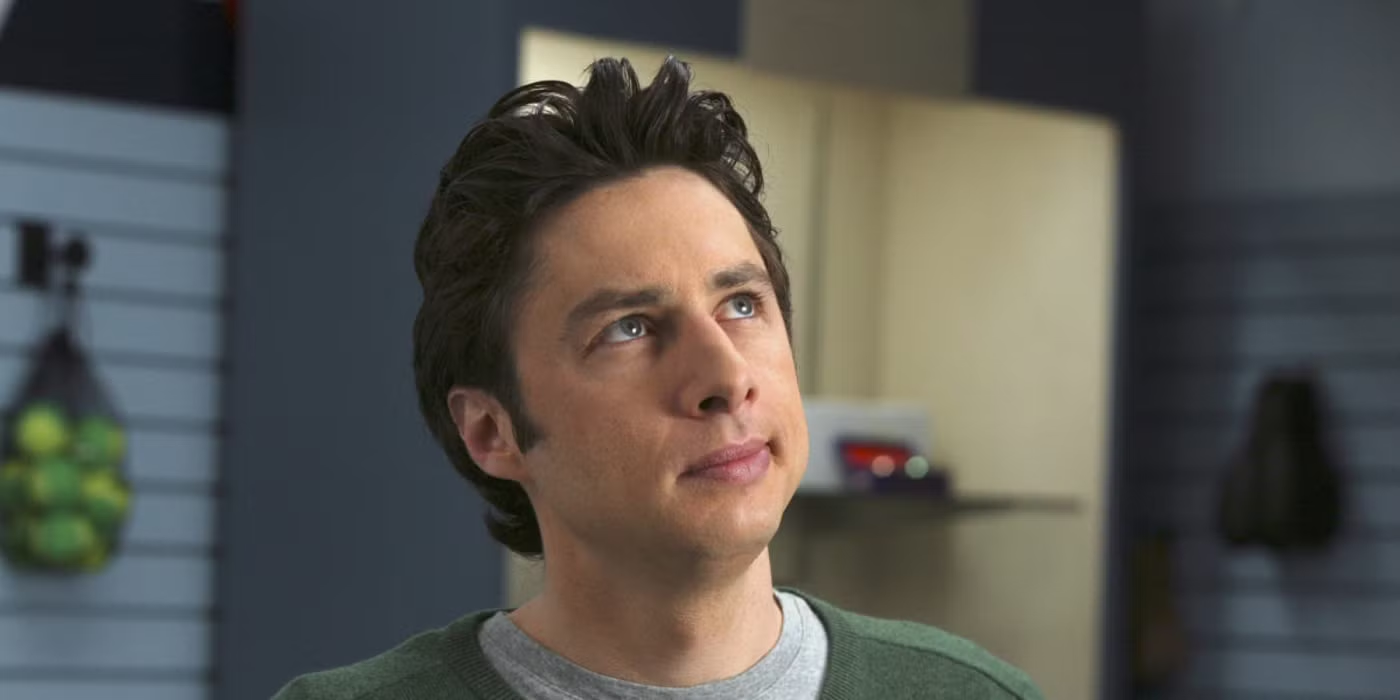
10. Overactive Imagination
During Scrubs entire run (except the final series thou shalt not be named) hinges on JD’s overactive imagination. His outlandish fantasies make for excellent comedy and unique sequiturs to break up the storylines. But what if this was yet another coping mechanism for the hapless leading man?
Children from challenging background often disappear into elaborate fantasy worlds in order to escape their surroundings. Is this a habit JD could never quite kick? It would explain why he doesn’t seem to have a lot of control of his daydreaming despite being an adult. It is a comfort and a way to deal with the difficult stuff life throws at him.
If any or all of these speculations are true Scrubs goes from being a mere half-hour sitcom to a story of one man’s triumph over his dark past. Despite his flaws and failings JD has still made something of himself and is surrounded by his chosen family; all of whom love him for who he is. This is extremely inspiring.
Movie
‘Mufasa: The Lion King’ Will Leave You Breathless

“Mufasa: The Lion King” is a visually stunning addition to the beloved Lion King franchise, offering a fresh and emotionally resonant take on the origins of one of Disney’s most iconic characters. The film beautifully explores Mufasa’s journey, balancing heartfelt moments with touches of comedy that lighten the mood and make the story accessible to audiences of all ages. The animation is breathtaking, capturing the vibrant landscapes and lush environments of the Pride Lands, adding depth to Mufasa’s character and his relationships.
The storytelling is compelling, effectively pulling at the heartstrings while providing insights into Mufasa’s character before he becomes the legendary king. However, the setup for Scar’s betrayal feels somewhat underdeveloped, lacking the deeper motivation that could have enriched their complex brotherly relationship. This missed opportunity leaves a slight gap in understanding Scar’s actions, which could have elevated the dramatic stakes.
The musical score is impressive, featuring memorable songs that enhance the emotional impact of pivotal scenes. While there are several standout tracks, one song, in particular, resonates deeply and is sure to linger in viewers’ minds long after the credits roll. Overall, “Mufasa: The Lion King” is an amazing film and a worthy addition to the Lion King lore that manages to deliver both laughter and tears, offering a rich tapestry of storytelling that fans will appreciate.
Movie
Is ‘Kraven the Hunter’ a Total Letdown?

“Kraven the Hunter,” directed by J.C. Chandor, aims to introduce a beloved Spider-Man villain to the big screen, but unfortunately, it falls short of expectations. The film suffers from noticeable issues, notably an overuse of ADR (Automated Dialogue Replacement), which detracts from the authenticity of the characters’ interactions and contributes to an uneven audio experience. This technical flaw is compounded by rough storytelling that feels disjointed and lacking in coherence, leaving viewers struggling to connect with the narrative.
Aaron Taylor-Johnson delivers a commendable performance as Kraven, showcasing the character’s gritty nature and complex motivations. His portrayal has potential, and it’s evident that he could elevate the character far beyond what is presented with a stronger script and direction. However, the absence of Spider-Man, a central figure in Kraven’s lore, leaves a void that the film struggles to fill. Without this critical connection, the plot meanders and fails to create the tension or stakes that fans of the superhero genre crave.
Additionally, including Rhino as a villain feels like a missed opportunity; he is presented more as a gag character with limited screen time, undermining any sense of threat or depth. For the average moviegoer, “Kraven the Hunter” might entertain but ultimately feels like a mediocre viewing experience. Comic book fans, however, may find disappointment in this lackluster attempt to create a solo character film. Instead of an exhilarating dive into Kraven’s world, the film presents a watered-down version, leaving audiences wishing for a more cohesive vision that honors its comic book roots.


